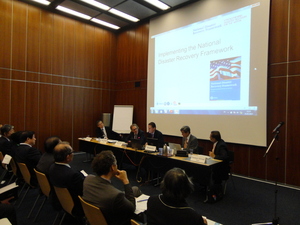23 May 2013, Geneva, Switzerland

The IRP secretariat and the Cabinet Office of Japan organized the forum "Lessons on Recovery from Mega-Disasters" with the participation of 124 people from ADRC, IRP partners, international and regional institutions, governments and NGOs, etc. The forum was also organized as the last session of the Expert Group Meetings on the Great East Japan Earthquake (GEJE) which had been held fourth times since 2011 by IRP with the Cabinet Office of Japan, ADRC and UN organizations, and the completion of the Recovery Status Report on the GEJE in which IRP has compiled experiences and lessons from the GEJE in corporation with Tohoku and Kobe University, etc. was announced in the forum.
Following the opening remark by Mr. Yoshitami Kameoka, Parliamentary Secretary of the Cabinet Office of Japan, and the message from Mr. Toshizo Ido, Governor of Hyogo Prefecture, delivered by Mr. Akinori Sugimoto, Superintendent for Disaster Management of Hyogo Prefecture, Prof. Yasuo Tanaka of Universiti Tunku Abdul Rahman (Emeritus Professor of Kobe University) moderated a panel discussion with experts serving as panelists, namely: Mr. Roger Sutton, Chief Executive, Canterbury Earthquake Recovery Authority (CERA), New Zealand; Prof. Yoshimitsu Shiozaki, Ritsumeikan University (Emeritus Professor of Kobe University), Japan; Mr. David Trissell, Federal Emergency Management Agency (FEMA), USA, and Lt. Gen. (Ret.) Nadeem Ahmed, Former Chairman, National Disaster Management Authority (NDMA) Pakistan. Each panelist made a presentation on recovery experiences and good practices of each country.
Mr. Roger Sutton highlighted the importance of speed in decision making as well as in reconstructing to avoid greater economic lost. He also mentioned the relevance of community engagement and strong institutional arrangements at time of recovery and reconstruction.
In the case of Japan, Prof. Yoshimitsu Shiozaki shared the recovery and reconstruction efforts from the Great East Japan Earthquake. One of the key observations during the recovery process is the engagement of private sector.
The United States of America, as presented by Mr. David Trissell, is one of those countries that developed the Recovery Framework. The framework proved to be useful, especially during the recovery from Hurricane Sandy. One of the core principles of the Recovery Framework is the "Pre-Disaster Recovery Planning" which sets forth the recovery support functions (RSF) even before the disaster happens.
In Pakistan, as reported Lt. Gen. (Ret.) Nadeem Ahmed, experiments were made to assess whether Recovery Framework can facilitate a more effective reconstruction. NDMA compared a Pakistan's disaster in which a recovery framework was put in place with the one in which there was no recovery framework. After observing the results, it was concluded that management of recovery under a recovery framework is more resilient and effective. It implies that recovery framework can significantly improve the governance of recovery efforts.
They further explored measures for integrating recovery in development planning as well as efforts towards effective recovery strategy and frameworks, and also highlighted the key strategic recommendations on recovery for HFA2.
IRP/ADRC also took advantage of disseminating its brochures and publications to the participants in the GP at the Market Place. In particular, Recovery Status Report on the Great East Japan Earthquake, along with other recovery reports and guidance notes on recovery, was showcased at the marketplace.
(2013/05/23 14:30)

